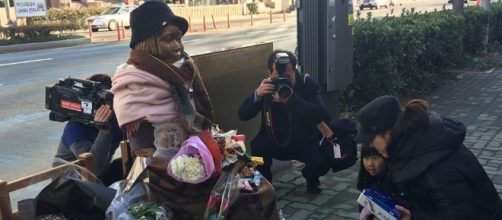An award-winning novelist called for masturbation on a statue symbolizing victims of the Japanese military Sexual Slavery during the World War II (1939-1945). Yasutaka Tsutsui, described as “one of modern Japan's most renowned writers" in his books, asked the public to “ejaculate” sperms on the statue installed in front of the Japanese consulate in Busan, South Korea, through Twitter on 6th of April.
As Japan’s ambassador, Yasumasa Nagamine, returned to South Korea on 4th of April, the statue’s installation seems to be accepted, the novelist, who won Tanizaki and the Kawabata prizes, Japan's prestigious awards for exemplary literary works, said.
What the statue means
The statue symbolizes women, each of whom were raped by many Japanese soldiers per day in Japanese military stations in China, Korea, Myanmar, the Philippines, and some other South Asian countries. During the war, the Japanese military called the women the "comfort women." The Japanese military killed or beat the women resisting against the rapes, the victims say. The entire number of victims are estimated by scholars to be in the hundreds of thousands.
The "comfort women" consisted of Koreans, Chinese, Taiwanese, Filipinos, Netherlanders and more nationalities. The victims, who are now in their 80's to 90's, say they were teenagers when the Japanese deceived them into false employment or were kidnapped, leading to the military sexual slavery.
South Korean activists installed the statue in front of the Japanese consulate in Busan, South Korea’s second-largest city, in December 2016. Japan recalled its ambassador in January, as its repetitive requests to South Korea to remove the statue were not met.
Viewpoints on the 'comfort women' statue
Japanese officials say that the statue’s placement is incompatible with South Korea’s promise to remove the statue in front of the Japanese embassy in Seoul, according to NHK.
In 2015, South Korean and Japanese governments announced that the Japanese government provides one billion Yen (9 million USD) to the living South Korean victims of the sexual slavery. Now 38 out of 239 South Korean victims who are registered with the South Korean Government are alive.
In return, the South Korean government agreed to solve the statue issue in “an appropriate manner.”
South Korean activists and the sexual slavery victims, the former "comfort women", oppose the deal, saying the Japanese government is denying its “legal responsibility”. In 2016, 12 South Korean victims sued the Korean government for its “giving up” on its duty to salvage its citizens.
South Korean activists have been installing a number of the statues across South Korea, the United States and Canada. They are aimed meant to memorialize and prevent the future military sexual slavery mindset, The Korean Council for the Women Drafted for Military Sexual Slavery by Japan says.
Yasutaka Tsutsui, 82 years old, has now deleted the tweet which triggered disapproval responses in Japan and South Korea.

